高中英语 unit 1 语法巩固训练 新人教版必修2
- 格式:doc
- 大小:97.00 KB
- 文档页数:5
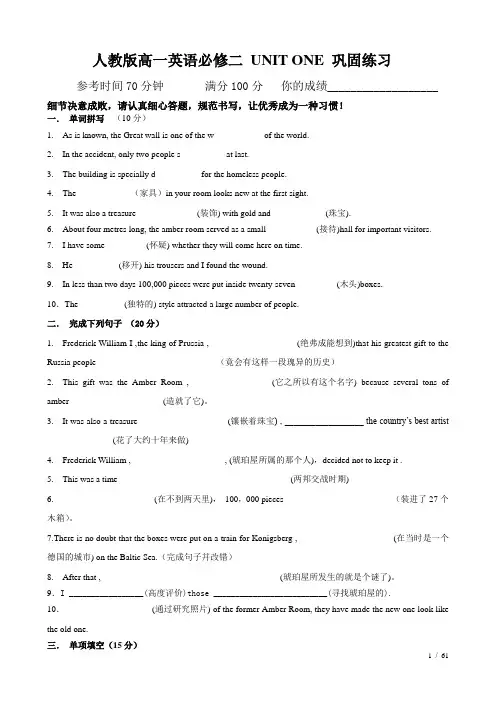
人教版高一英语必修二UNIT ONE 巩固练习参考时间70分钟满分100分你的成绩___________________细节决意成败,请认真细心答题,规范书写,让优秀成为一种习惯!一.单词拼写(10分)1. As is known, the Great wall is one of the w___________ of the world.2. In the accident, only two people s__________ at last.3. The building is specially d__________ for the homeless people.4. The ___________ (家具)in your room looks new at the first sight.5. It was also a treasure______________(装饰) with gold and ____________(珠宝).6. About four metres long, the amber room served as a small ___________(接待)hall for important visitors.7. I have some _________(怀疑) whether they will come here on time.8. He __________(移开) his trousers and I found the wound.9. In less than two days 100,000 pieces were put inside twenty-seven _________(木头)boxes.10.The __________(独特的) style attracted a large number of people.二.完成下列句子(20分)1. Frederick William I ,the king of Prussia , ___________________ (绝弗成能想到)that his greatest gift to the Russia people ___________________________(竟会有这样一段瑰异的历史)2. This gift was the Amber Room ,___________________(它之所以有这个名字) because several tons of amber _____________________(造就了它)。
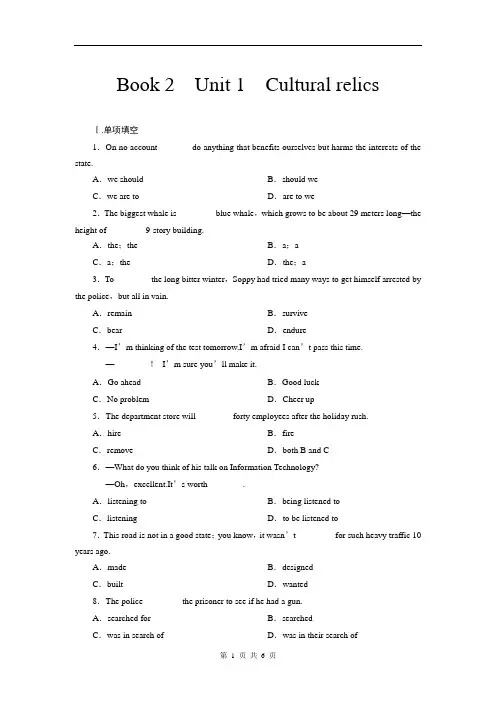
Book 2Unit 1Cultural relicsⅠ.单项填空1.On no account________do anything that benefits ourselves but harms the interests of the state.A.we should B.should weC.we are to D.are to we2.The biggest whale is ________ blue whale,which grows to be about 29 meters long—the height of ________ 9-story building.A.the;the B.a;aC.a;the D.the;a3.To________ the long bitter winter,Soppy had tried many ways to get himself arrested by the police,but all in vain.A.remain B.surviveC.bear D.endure4.—I’m thinking of the test tomorrow.I’m afraid I can’t pass this time.—________!I’m sure you’ll make it.A.Go ahead B.Good luckC.No problem D.Cheer up5.The department store will________ forty employees after the holiday rush.A.hire B.fireC.remove D.both B and C6.—What do you think of his talk on Information Technology?—Oh,excellent.It’s worth________.A.listening to B.being listened toC.listening D.to be listened to7.This road is not in a good state;you know,it wasn’t ________ for such heavy traffic 10 years ago.A.made B.designedC.built D.wanted8.The police ________ the prisoner to see if he had a gun.A.searched for B.searchedC.was in search of D.was in their search of9.To all the people here________ the honour for the other day.A.belong B.belongsC.belongs to D.is belonged10.I don’t think such a young child will be able to________ the two Italian visitors apart.A.say B.speakC.read D.tell11.Yang Liwei is regarded as our national hero,who is________.A.thinking high of B.thought high ofC.highly thought of D.thinking highly of12.Some women________a good salary in a job instead of staying at home,but they decided not to work for the sake of the family.A.must make B.should have madeC.would make D.could have made13.We are expected to arrive at the village before dark.I don’t doubt ________ we can make it by then.A.whether B.thatC.when D.where14.Has she ever asked for the reason________ may explain his coming late?A.why B.for whichC.that D.for that15.About two hundred people are working in his company now,most of________ were once out of work.A.which B.whoC.that D.whomⅡ.完形填空Recently,I began seeking my dream of becoming a motivational(激励人的) speaker.After a four-year relationship with Fortune 100 Company __16__ as a sales trainer and ending as a regional(区域的) sales manager,I left the company at the __17__ of my career.Many people were __18__ that I would leave after earning a six-figure __19__.And they asked why I would risk everything for a __20__.I made a decision to start my __21__ company after attending a regional sales meeting.The vice-president of our company delivered a __22__ that changed my life.He asked us,“If a god would __23__ you three wishes,what would they be?”After giving us a __24__ to write down the three wishes,he then asked us,“__25__ do you need a god?”I would never forget the power I __26__ at that moment.I realized that everything I had achieved in the past had __27__me for this moment.I was __28__ and didn’t need a god’s help to become a motivational speaker.A motivational speaker was __29__.Having made that decision,I was immediately __30__.One week after I gave notice for engagements(签约),I __31__ my cellphone.Worse still,half a year passed and I didn’t get any engagements __32__.But I held fast to my dream.The wonder __33__ began to happen.About seven months later,I was able to book quite a few __34__ engagements with new customers.I discovered the incredible (难以置信的) __35__ of dreams.16.A.acting B.beginningC.considering D.working17.A.crossroad B.edgeC.length D.height18.A.disappointed B.movedC.surprised D.worried19.A.income B.wealthC.position D.respect20.A.dream B.personC.promise D.speaker21.A.good B.bigC.new D.own22.A.message B.passageC.speech D.letter23.A.answer B.offerC.share D.tell24.A.hand B.paperC.moment D.second25.A.Why B.WhereC.When D.How26.A.felt B.gaveC.made D.sent27.forted B.preparedC.changed D.driven28.A.happy B.proudC.ready D.well29.A.made B.formedC.brought D.born30.A.tested B.checkedC.punished D.shocked31.A.bought B.soldC.lost D.found32.A.at last B.at allC.at most D.at least33.A.almost B.reallyC.hardly D.gradually34.A.speaking B.trainingC.selling D.writing35.A.force B.helpC.effect D.powerⅢ.阅读理解A new research has uncovered that culture is a determiningfactor when people interpret facial emotions (情感).The studyreveals that in cultures where emotional control is the standard,such as Japan,the focus is placed on the eyes to interpretemotions.Whereas in cultures where emotion is openly expressed,such as the United States,the focus is on the mouth to interpret emotions.“These findings go against the popular theory that the facial expressions of basic emotions can be universally recognized,” said University of Alberta researcher Dr.Takahiko Masuda.”A person’s culture plays a very strong role in determining how he will read emotions and needs to be considered when interpreting the facial expressions.”These cultural differences are even noticeable in computer emoticons(情感符号),which are used to convey a writer’s emotions by email and text message.The Japanese emotions for happiness and sadness vary in terms of how the eyes are drawn ,while the American emotions vary with the direction of the mouth.In the United States the emoticons∶)and∶-) show a happy face,whereas the emoticons∶(and∶-(show a sad face.However,the Japanese tend to use the symbol (‘-‘) to indicate a happy face,and (;-;) to indicate a sad face.“We think it is quite interesting and appropriate that culture tends to mask its emotions.The Japanese would focus on a person’s eyes when detecting his or her emotions,as eyes tend to be quite subtle(微妙的),”said Masuda.“In the United States,where an open emotion is quitecommon,it makes sense to focus on the mouth,which is the most expressive feature on a person’s face.”36.The text mainly tells us that ________.A.cultural differences are expressed in emotionsB.culture is a key to interpreting facial emotionsC.different emoticons are preferred in different culturesD.people from different cultures express emotions differently37.Which emoticon is used by Americans to show a happy face?A.(;-;) B.∶-)C.∶-( D.∶(38.If a Japanese wants to detect whether a smile is true or false,he will probably________.A.read the whole face B.focus on the mouthC.look into the eyes D.judge by the voice39.People used to believe that ________.A.some facial expressions of emotions were too complex to be recognizedB.people in the world interpreted basic emotions in different waysC.people could only recognize the facial expressions of basic emotionsD.people all over the world understood basic emotions in the same way40.The computer emoticons used by Americans show that________.A.they express their feelings openlyB.they tend to control their emotionsC.they are good at conveying their emotionsD.they use simpler emotions to show their feelings1.B2.D3.B4.D5.D6.A7.B8.B9.B 10.D 11.C 12.D 13.B 14.C15.D16.B 17.D 18.C 19.A 20.A 21.D 22.C 23.B 24.C 25.A 26.A 27.B 28.C 29.D 30.A 31.C 32.B33.B 34.A 35.D36.B 37.B 38.C 39.D 40.A。
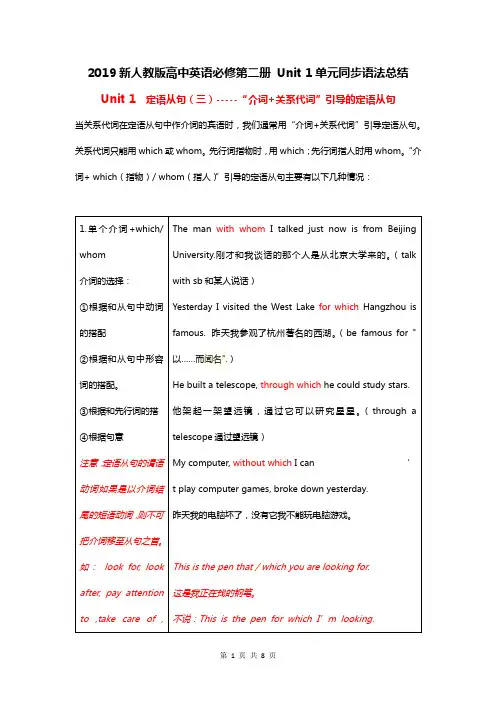
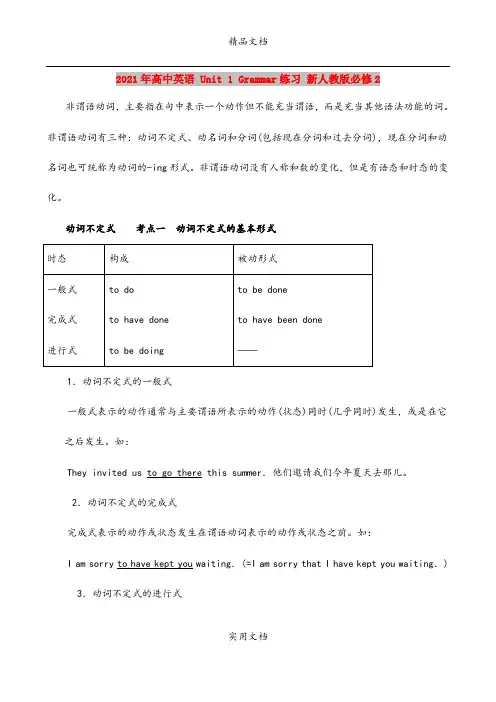
2021年高中英语 Unit 1 Grammar练习新人教版必修2非谓语动词,主要指在句中表示一个动作但不能充当谓语,而是充当其他语法功能的词。
非谓语动词有三种:动词不定式、动名词和分词(包括现在分词和过去分词),现在分词和动名词也可统称为动词的-ing形式。
非谓语动词没有人称和数的变化,但是有语态和时态的变化。
动词不定式考点一动词不定式的基本形式1.动词不定式的一般式一般式表示的动作通常与主要谓语所表示的动作(状态)同时(几乎同时)发生,或是在它之后发生。
如:They invited us to go there this summer.他们邀请我们今年夏天去那儿。
2.动词不定式的完成式完成式表示的动作或状态发生在谓语动词表示的动作或状态之前。
如:I am sorry to have kept you waiting.(=I am sorry that I have kept you waiting.) 3.动词不定式的进行式进行式表示的动作或状态在谓语动词表示的动作或状态发生时正在进行。
如:They pretended to be working very hard.他们假装在努力工作。
4动词不定式的被动式The next thing to be done is to get our classroom painted.下一步要做的事是把我们的教室粉刷一次。
5.动词不定式的完成被动式 She seems to have been told everything.看来她都知道了。
6.动词不定式的否定式动词不定式的否定式是在to前面加not,(有时强调也用never)如:She decided not to be late again.她决定不再迟到了。
He promises never to make such a stupid mistake.他许诺不再犯这样愚蠢的错误了。
考点二动词不定式的基本用法动词不定式具有副词、形容词和名词的特征,因此在句中可作状语、定语、宾语、宾语补足语、表语和主语等成分。
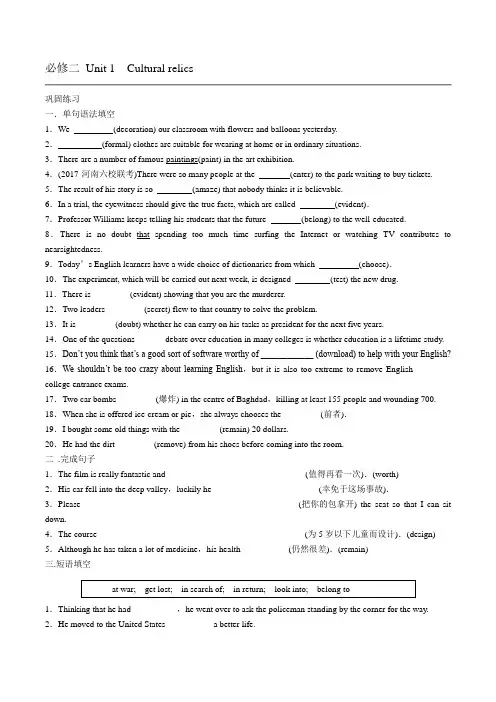
必修二Unit 1Cultural relics巩固练习一.单句语法填空1.We (decoration) our classroom with flowers and balloons yesterday.2.(formal) clothes are suitable for wearing at home or in ordinary situations.3.There are a number of famous paintings(paint) in the art exhibition.4.(2017·河南六校联考)There were so many people at the (enter) to the park waiting to buy tickets.5.The result of his story is so (amaze) that nobody thinks it is believable.6.In a trial, the eyewitness should give the true facts, which are called (evident).7.Professor Williams keeps telling his students that the future (belong) to the well-educated.8.There is no doubt that spending too much time surfing the Internet or watching TV contributes to nearsightedness.9.Today’s English learners have a wide choice of dictionaries from which (choose).10.The experiment, which will be carried out next week, is designed (test) the new drug.11.There is ________ (evident) showing that you are the murderer.12.Two leaders ________ (secret) flew to that country to solve the problem.13.It is ________ (doubt) whether he can carry on his tasks as president for the next five years.14.One of the questions ______ debate over education in many colleges is whether education is a lifetime study. 15.Don’t you think that’s a good sort of software worthy of ____________ (download) to help with your English? 16.We shouldn’t be too crazy about learning English,but it is also too extreme to remove English ________ college entrance exams.17.Two car bombs ________ (爆炸) in the centre of Baghdad,killing at least 155 people and wounding 700. 18.When she is offered ice-cream or pie,she always chooses the ________ (前者).19.I bought some old things with the ________ (remain) 20 dollars.20.He had the dirt ________ (remove) from his shoes before coming into the room.二.完成句子1.The film is really fantastic and________________________________(值得再看一次).(worth)2.His car fell into the deep valley,luckily he ________________________(幸免于这场事故).3.Please _________________________________________________(把你的包拿开) theseat so that I can sit down.4.The course _______________________________________________(为5岁以下儿童而设计).(design) 5.Although he has taken a lot of medicine,his health __________ (仍然很差).(remain)三.短语填空1.Thinking that he had __________,he went over to ask the policeman standing by the corner for the way. 2.He moved to the United States __________ a better life.3.A working party has been set up to __________ the problem specially.4.The country has been __________ with its neighbors for more than two years.5.We find comfort in giving care and receiving care __________.6.He is considering selling the old house that __________ his grandparents and using the money to start a business of his own.三.单句改错1.It is possible for most senior citizens to remain actively after they retire.2.The film is so excellent that it is worth see a second time.3.Taking apart the machine to see if there is something wrong with it.4.I have some doubt whether they will think high of my plan.5.It is said that the early European playing cards were designed to entertainment and education.6.With its focus divided, the lion becomes confused and is unsure about what it to do next.四.完成句子1.The police ____________ (搜查小偷) to see what he had in his pockets.2.At the railway station I took a bag by mistake ____________________ (属于别的某个人的).3.While staying in the village,James unselfishly shared whatever he had with the villagers without __________________________ (索要任何回报).4.The machine __________________ (被拆开) and the useful parts were sold.5.In his speech,he ________________ (高度评价) the achievements we had made.五.语法填空阅读下面材料,在空白处填入适当的内容(1个单词)或括号内单词的正确形式。
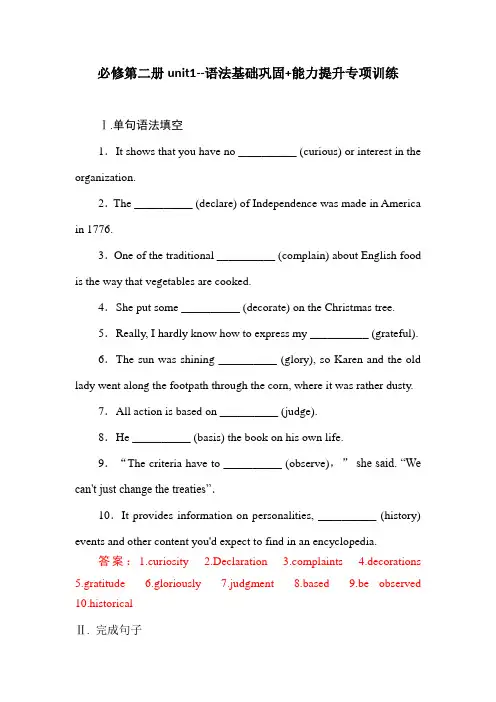
必修第二册unit1--语法基础巩固+能力提升专项训练Ⅰ.单句语法填空1.It shows that you have no __________ (curious) or interest in the organization.2.The __________ (declare) of Independence was made in America in 1776.3.One of the traditional __________ (complain) about English food is the way that vegetables are cooked.4.She put some __________ (decorate) on the Christmas tree.5.Really, I hardly know how to express my __________ (grateful).6.The sun was shining __________ (glory), so Karen and the old lady went along the footpath through the corn, where it was rather dusty.7.All action is based on __________ (judge).8.He __________ (basis) the book on his own life.9.“The criteria have to __________ (observe),”she said. “We can't just change the treaties”.10.It provides information on personalities, __________ (history) events and other content you'd expect to find in an encyclopedia.答案:1.curiosity 2.Declaration plaints 4.decorations 5.gratitude 6.gloriously7.judgment8.based9.be observed 10.historicalⅡ. 完成句子1. 找到一些小组活动,你可以与那些和你有同样兴趣的人在一起。
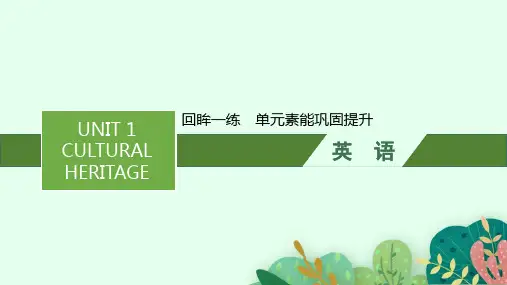
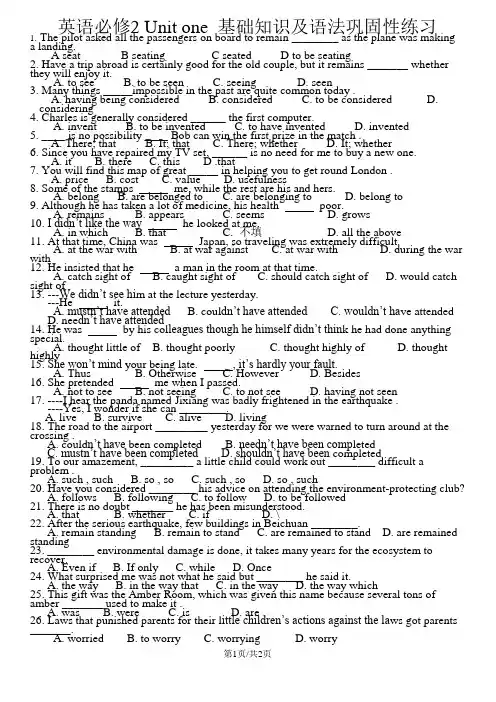
英语必修2 Unit one 基础知识及语法巩固性练习1. The pilot asked all the passengers on board to remain ________ as the plane was makinga landing.A seatB seatingC seatedD to be seating2. Have a trip abroad is certainly good for the old couple, but it remains _______ whether they will enjoy it.A. to seeB. to be seenC. seeingD. seen3. Many things _____impossible in the past are quite common today .A. having being consideredB. consideredC. to be consideredD. considering4. Charles is generally considered ______ the first computer.A. inventB. to be inventedC. to have inventedD. invented5. ____ is no possibility ____ Bob can win the first prize in the match .A. There; thatB. It; thatC. There; whetherD. It; whether6. Since you have repaired my TV set, ______ is no need for me to buy a new one.A. itB. thereC. this D .that7. You will find this map of great _____ in helping you to get round London .A. priceB. costC. valueD. usefulness8. Some of the stamps me, while the rest are his and hers.A. belongB. are belonged toC. are belonging toD. belong to9. Although he has taken a lot of medicine, his health poor.A. remainsB. appearsC. seemsD. grows10. I didn’t like the way he looked at me.A. in whichB. thatC. 不填D. all the above11. At that time, China was Japan, so traveling was extremely difficult.A. at the war withB. at war againstC. at war withD. during the war with12. He insisted that he a man in the room at that time.A. catch sight ofB. caught sight ofC. should catch sight ofD. would catch sight of13. ---We didn’t see hi m at the lecture yesterday.---He it.A. mustn’t have attendedB. coul dn’t have attendedC. wouldn’t ha ve attendedD. nee dn’t have attended14. He was by his col leagues though he himself didn’t thin k he had done anything special.A. thought little ofB. thought poorlyC. thought highly ofD. thought highly15. She won’t mind your being late. , it’s hardly your fault.A. ThusB. OtherwiseC. HoweverD. Besides16. She pretended me when I passed.A. not to seeB. not seeingC. to not seeD. having not seen17. ----I hear the panda named Jixiang was badly frightened in the earthquake .----Yes, I wonder if she can ________.A. liveB. surviveC. aliveD. living18. The road to the airport _________ yesterday for we were warned to turn around at the crossing .A. could n’t have been completedB. needn’t have been comp letedC. mustn’t have been completedD. shouldn’t have been completed19. To our amazement, _________ a little child could work out ________ difficult a problem .A. such , suchB. so , soC. such , soD. so , such20. Have you considered ________ his advice on attending the environment-protecting club?A. followsB. followingC. to followD. to be followed21. There is no doubt _______ he has been misunderstood.A. thatB. whetherC. ifD. \22. After the serious earthquake, few buildings in Beichuan ________.A. remain standingB. remain to standC. are remained to standD. are remained standing23. ________ environmental damage is done, it takes many years for the ecosystem to recover.A. Even ifB. If onlyC. whileD. Once24. What surprised me was not what he said but ________ he said it.A. the wayB. in the way thatC. in the wayD. the way which25. This gift was the Amber Room, which was given this name because several tons of amber _______ used to make it .A. wasB. wereC. isD. are26. Laws that punished parents for their l ittle children’s actions against the la ws got parents _______.A. worriedB. to worryC. worryingD. worry27. If anyone happens to drop in while I am out, ________ him or her leave a message.A. haveB. getC. askD. tell28. Can you fancy yourself ________ on the moon by manned spacecraft in the near future?A. landB. to landC. landingD. to be landed29. Since he came to our school two years ago, Mr. Liu ________ a smart, honest andhard-working teacher.A. provedB. appearedC. been provedD. been appeared30. Although yo ur idea sounds reasonable, I’m afraid that I can’t ________ what yo u said.A. agree toB. agree onC. agree withD. agree about31. It’s the manager _______ the workers that ________ responsible for the fault.A. rather than, areB. rather than, isC. other than, isD. other than, are32. ----What has Tom been doing recently?----I don’t know, ________ care.A. nor do IB. nor I doC. neither am ID. neither I am33. Many university graduates have gone to the west of China to make a fortune, _______ isjust like the American youth going to the West in history.A. itB. whichC. thatD. what34. Have you ever considered ________ to do with something you find by accident ?A. HowB. whichC. whatD. that35. The young mother saw her baby fall to the ground, ________ brought her heart to her mouth.A. itB. whenC. whichD. that36. This is Mr. Smith, ________ I think has something interesting to tell you .A. whoB. whomC. thatD. \37. _____ is reported in the newspapers, talks between China and Russia are making progress.A. ItB. AsC. ThatD. What38. You were very important to him just now, for ______ you should make an apology to him, I think.A. thisB. whichC. whatD. that39. Some pre-school children go to a day care center, _____ they learn simple games and songs.A. thenB. thereC. whileD. where40. He was educated at the local high school, ________ he went into Beijing University.A. after whichB. after thatC. in whichD. in that41. The owner of the cinema needed to make a lot of improvements and employ more peopleto keep it running, _______ meant spending tens of thousands of pounds.A. whoB. thatC. asD. which42. Last month, part of Southeast Asia was struck by floods, from ________ effects the people are still suffering.A. thatB. whoseC. thoseD. what43. Pop music is such an important part of society ________ it has even influenced our language.A. whichB. thatC. whichD. where44. We s houldn’t spend our money testing so many people, most of _______ are healthy.A. thatB. whichC. whatD. whom45. Today we will discuss a number of cases ________ beginners of English fail to use the language properly.A. whichB. asC. whyD. where46. After graduation she reached a point in her career ________ she needed to decide what to do.A. thatB. whatC. whichD. where47. —What’s your opinion of the movie we saw last night?A. Not a bad ideaB. I’m afraid notC. Rather bor ingD. Watch out48. We Chinese must stick to One-China policy, ______ is of great importance to China.A. thatB. whichC. whatD. where49. —Do you know Lily has gone to London?—Oh. ______ I haven’t seen her these days.A. No doubtB. No wonderC. No possibleD. No chance50. Don’t pretend . Your newspaper is upside down.A. to readB. to be readingC. to have readD. readingKey: CBBCA BCDAD CBBCD ABACB AADAB AACAC BABCCABBDA DBBDD DCBBB。
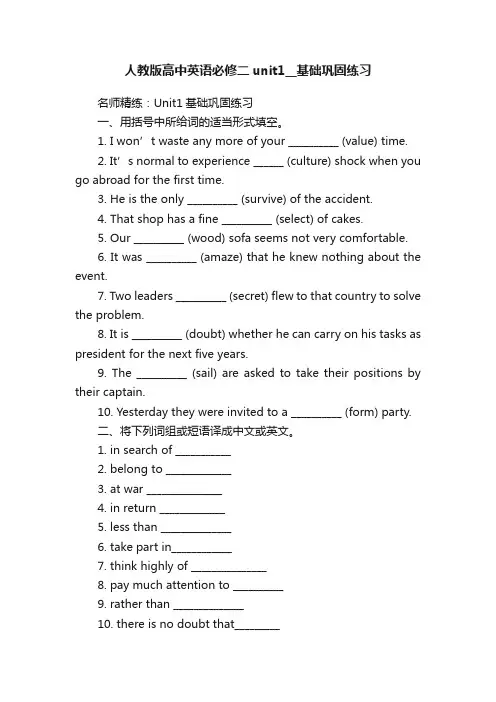
人教版高中英语必修二unit1__基础巩固练习名师精练:Unit1基础巩固练习一、用括号中所给词的适当形式填空。
1. I won’t waste any more of your __________ (value) time.2. It’s normal to experience ______ (culture) shock when you go abroad for the first time.3. He is the only __________ (survive) of the accident.4. That shop has a fine __________ (select) of cakes.5. Our __________ (wood) sofa seems not very comfortable.6. It was __________ (amaze) that he knew nothing about the event.7. Two leaders __________ (secret) flew to that country to solve the problem.8. It is __________ (doubt) whether he can carry on his tasks as president for the next five years.9. The __________ (sail) are asked to take their positions by their captain.10. Yesterday they were invited to a __________ (form) party.二、将下列词组或短语译成中文或英文。
1. in search of ___________2. belong to _____________3. at war _______________4. in return _____________5. less than ______________6. take part in____________7. think highly of _______________8. pay much attention to __________9. rather than ______________10. there is no doubt that_________11.文化遗产_______________12. 调查_______________13. 充当;作……之用_______________14. 在某一点上达成协议_______________15. 认为……是……;把……看作…… _______________三、根据提示完成句子:1. 他们成立了一个委员会来调查这一事件。
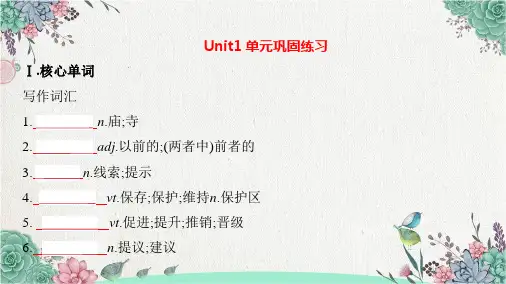
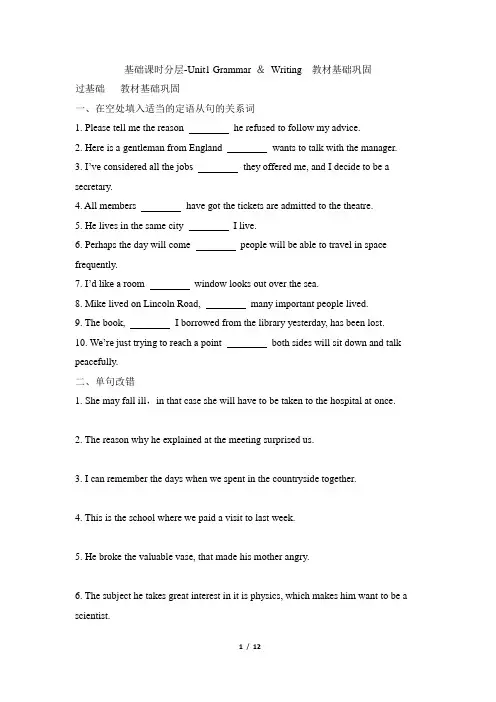
基础课时分层-Unit1 Grammar &Writing 教材基础巩固过基础教材基础巩固一、在空处填入适当的定语从句的关系词1. Please tell me the reason he refused to follow my advice.2. Here is a gentleman from England wants to talk with the manager.3. I’ve considered all the jobs they offered me, and I decide to be a secretary.4. All members have got the tickets are admitted to the theatre.5. He lives in the same city I live.6. Perhaps the day will come people will be able to travel in space frequently.7. I’d like a room window looks out over the sea.8. Mike lived on Lincoln Road, many important people lived.9. The book, I borrowed from the library yesterday, has been lost.10. We’re just trying to reach a point both sides will sit down and talk peacefully.二、单句改错1. She may fall ill,in that case she will have to be taken to the hospital at once. ________________________________________________________2. The reason why he explained at the meeting surprised us.________________________________________________________3. I can remember the days when we spent in the countryside together.________________________________________________________4. This is the school where we paid a visit to last week.________________________________________________________5. He broke the valuable vase, that made his mother angry.________________________________________________________6. The subject he takes great interest in it is physics, which makes him want to be a scientist.________________________________________________________7. Mr. Black, that is a doctor, rescued me from the river.________________________________________________________8. My cousin, who father is a teacher, wants to be an actor.________________________________________________________9. Xi’an is one of the few cities, which the ancient walls remain as good as before. ________________________________________________________10. There are a lot of islands in China, for which the largest is Taiwan.________________________________________________________三、单句语法填空1. She is one of the students who (be) invited to attend the composition contest.2. She is the only one of the students who (be) invited to attend the composition contest.3. The English play in my students acted at the New Year’s party was a great success.4. We were deeply impressed by the teachers and the schools we had visited there.5. Is this museum the they visited ten months ago?6. The books on the desk, of the covers are shiny, are prizes for us.7. I went to see my friends, the Smiths, (who) house is located in the center of town.8. There was a time the two countries were at war and there were no diplomatic relations.9. is known to all of us, Judge Smith has a reputation for being strict but fair.10. She got married again, was unexpected.四、用定语从句翻译句子1. 住在我家隔壁的那位老人过去是一名老师。
必修二Unit 1知识清单+巩固练习***知识清单***一、重点单词1.former adj 以前的;(两者中)前者的《1》前者......后者......the former … the latter…★我赞成前一个观点而他支持后一个。
I’m in favor of the former opinion while he is in support of the latter one.2.preserve vt.保存;保护;维持;n.保护区《1》保护......免受......preserve… from/against doing sth《2》保存完好的well-preserved★保护环境免受污染至关重要。
It is highly important to preserve the environment from being polluted.☞ preservaton n.保护3.promote vt.促进;提升;推销;晋级《1》促进和平promote peace《2》得到晋升get promoted★由于缺乏专业知识,他没有得到提升。
He failed to get promoted for lack of professional knowledge.☞ promotion n.提升,促销4.application 申请表;用途;运用;应用(程序)《1》求职信 A job application (letter)《2》申请信,求职信A letter of application《3》向......提出申请→ apply to sb for sth→ make an application to sb for sth《4》致力于apply oneself/one’s mind to doing sth★你只有专心学习,才会通过考试。
You will pass the exam only if you really apply yourself to your study.☞ apply v.运用,应用5.banace n.平衡;均匀vt. 使平衡《1》保持平衡keep balance《2》保持均衡的饮食keep a balanced diet《3》失去平衡: lose one’s balance/ out of balance 《5》使A和B平衡keep a balance between A and B 《6》总的来说On balance6.proposal n.提议;建议《1》提出建议make/put forward a proposal《2》同意、接受提议approve of/accept a proposal ★他们都同意我的建议,我们分摊计程车费。
高考英语总复习 Unit1 基础巩固练习名师全程导学案(新人教版必修2)Ⅰ. 单词拼写1. There is no ________(怀疑)that he will attend the meeting on time.答案:doubt2. It ________(使惊愕)her that he could be so calm at such a time.答案:amazed3. The woman ________(挑选)the best things from the shop.答案:selected4. I’ll meet you at the ________(入口)of the zoo tomorrow.答案:entrance5. After a long ________(辩论),the bill was passed.答案:debateⅡ. 选词填空at war;in search of;no doubt;think highly of;in return for1. The hungry boy rushed into the house ________ something to eat.答案:in search of2. The boy’s father ________ the man who saved his son from the lake.答案:thinks/thought highly of3. Those countries have been ________ for a long time. People there suffer a lot.答案:at war4. I work hard ________ those who care for me,help me and love me.答案:in return for5. There is ________ that he will be punished for what he has done.答案:no doubtⅢ. 易错模块1. (2008年高考辽宁卷)Please remain ________;the winner of the prize will be announced soon.A. seatingB. seatedC. to seatD. to be seated解析:选B。
Unit 2The Olympic Games Ⅰ.单项填空1.With so much water being used in the bathroom,it is no________ that more environmentally friendly technologies have come out to make better use of water resources.A.surprise B.needC.question D.doubt2.The girls ________ into the company recently have to receive strict training before they start to work.A.accepted B.acceptingC.admitted D.admitting3.—Excuse me, can you tell me where the nearest bank is, please?—________ Oh yes! It’s past the office,next to a big market.A.Mm,let me think. B.Oh,I beg your pardon?C.You’re welcome. D.What do you mean?4.—My old tyre exploded,can you________ it with a new one?—Certainly,wait a minute.A.take the place of B.replaceC.take place D.in place of5.In order to find ________ better job,he decided to study ________ second foreign language.A.the;a B.a;aC.the;the D.a;the6.He felt that he didn’t________ to be given such a great honor.A.suppose B.deserveC.mean D.intend7.Tom as well as his friends who________football games________traveled with the team.A.likes;has B.like;haveC.likes;have D.like;has8.These dictionaries ________ the library again (by you).A.must be taken out B.mustn’t be taken out ofC.must take out of D.mustn’t take out of9.He didn’t ________ school the day before yesterday.A.attend B.joinC.join in D.take part in10.________ a chair in the corner of the room?A.Does there stand B.Stand thereC.There standing D.Do stand there11.I shall________ the loss of my laptop computer in the newspaper,with a reward for the finder.A.inform B.advertiseC.announce D.publish12.—Excuse me,sir.Would you do me a favor?—Of course.What is it?—I________ if you could tell me how to fill out this form.A.had wondered B.was wonderingC.would wonder D.did wonder13.Only when your identity has been checked________.A.you are allowed in B.you will be allowed inC.will you allow in D.will you be allowed in14.He hasn’t been to the countryside;________ he want to go there.A.so has B.so doesC.neither has D.neither does15.The wise little girl can ride a horse and swim,and she can shoot________.A.as well as B.as wellC.either D.alsoⅡ.阅读理解AIt might seem hard to imagine that a bad tooth could bedeadly.But doctors in the Washington area say a twelve-year-oldboy died last month of a tooth infection that spread to hisbrain.They say it might have been prevented if the boy had receivedthe dental care he needed.Experts at the National Institutes of Health say good dentalcare should start at birth.They say breast milk is the best food for the healthy development of teeth.Breast milk can help slow bacterial growth and acid production in the mouth.When baby’s teeth begin to appear,you can clean them with a wet toothbrush.Dentists say it is important to find soft toothbrushes made especially for babies,and use them very gently.The use of fluoride (氟化物) to protect teeth is common in many parts of the world.Thisnatural element is often added to drinking water supplies.The fluoride mixes with enamel(釉质),the hard surface on teeth,to help prevent holes,or cavities from forming.But the American Academy of Pediatric Dentistry points out that young children often swallow toothpaste when they brush their teeth.The group notes that swallowing fluoridated toothpaste can cause problems.So young children should be carefully supervised when they brush their teeth.And only a small amount of fluoridated toothpaste,the size of a green pea,should be used.Parents often wonder what effects sucking a thumb or sucking on a pacifier might have on their baby’s teeth.Dental experts generally agree that this is fine early in life.The American Academy of Family Physicians says most kids stop sucking their thumbs by the age of four.If it continues,the group advises parents to talk to their child’s dentist or doctor.It could influence the correct development of permanent teeth.16.The boy with a bad tooth died because________.A.his tooth disease was very deadlyB.the doctor refused to treat him properlyC.he didn’t receive timely treatmentD.something was wrong with his brain17.All the following statements are good to teeth except that ________.A.children live on breast milk every dayB.children begin to brush their teeth when they are old enoughC.children use fluoride toothpaste to brush their teethD.children form the habit of sucking their thumbs18.The underlined word “supervised” in the fifth paragraph means “________”.A.watched and directed B.taught and helpedC.praised and advised D.led and pointed out19.Which one of the followings is NOT true according to this passage?A.Dental care should be given to babies as soon as they are born.B.Special toothbrushes should be used for babies.C.Breast milk and fluoride are helpful to protect baby teeth.D.Dental experts suggest stopping babies sucking their thumbs.20.The best title of this passage is ________.A.The reason of a twelve-year-old boy’s deathB.Baby teeth should be cared for from birthC.Breast milk and fluoride are importantD.How to help young children form good habitsBRoberto Clemente was one of the most honored baseball players inhistory.Many players are known for their skills or the records theybroke.But Roberto was loved not only for his ability in sports,but alsofor the kind of person that he was.Roberto was born in 1934 in Carolina,Puerto Rico,whose family struggled financially.As a young boy,he helped his father,who worked on a sugar farm and also managed a store that sold food.In school,Roberto was an excellent runner.But more than anything,he loved playing baseball.Puerto Rico’s warm island climate made it easy for the young boy to play baseball all year.But he was good at throwing balls to a great distance.While in high school,Roberto played baseball for the Santurce Crabbers in the Puerto Rico’s Winter League.At 18,Roberto was already hitting a baseball better than many professional players in the United States.This ability was recognized the following year.An official from the Brooklyn Dodgers team in New York City came to Puerto Rico looking for new young players.The official,Al Campanis,was pleased with Roberto’s skills.He offered to give him a 10,000 dollar gift to play for the Brooklyn Dodgers.But Roberto was unable to join the major league team because he was still in high school.The young baseball player told Mr.Campanis that he would join the Brooklyn team as soon as he finished school.So Roberto joined the Brooklyn Dodgers after finishing high school.But Roberto began playing for the Pittsburgh Pirates in 1955.Roberto stood out among the other players in his team.The Pittsburgh Pirates did not do well the first few years when Roberto played in the team.But in 1960,everything changed.That year,he played in the first of his 12 All-Star games.Every year,the best players from the National and American leagues compete in an All-Star game.That same year,Roberto helped his team beat the New York Yankees to win the World Series—the national baseball championship.Roberto died on December 31,1972,in a plane crash while attempting to deliver aid to earthquake victims in Nicaragua.21.Roberto Clemente was highly honored because________.A.of his intelligenceB.he had no competitorsC.he was kind and generousD.of his personality and skills22.What do we know about Roberto according to the text?A.Roberto was not helpful.B.His family lived a happy life.C.His father worked very hard.D.Roberto had no interest in sports.23.Why did Mr.Campanis offer Roberto a 10,000 dollar gift?A.He was impressed by Roberto’s ability.B.He wanted to make friends with Roberto.C.Roberto played better than professional players.D.He invited Roberto to quit school and play for his team.24.Thanks to Roberto,the Pittsburgh Pirates________.A.defeated other 12 All-Star teamsB.was better widely known worldwideC.won the national baseball championshipD.beat the New York Yankees for the first time25.What would be the best title for the text?A.Roberto ClementeB.A Famous Black Baseball PlayerC.He Played 12 All-Star GamesD.The Pittsburgh Pirates’ Memory1.A2.C3.A4.B5.B6.B7.D8.B9.A 10.A 11.B 12.B 13.D 14.D 15.B 16.C 17.B 18.A 19.D 20.B 21.D 22.C 23.A 24.C 25.A。
Unit 1Section ⅡⅠ.用所给词的适当形式填空导学号 571440351.(2017·天津,9改编)My eldest son, __whose__ work takes him all over the world, is in New York at the moment.解析:考查定语从句。
句意:我长子现在在纽约,他的工作让他全世界到处跑。
分析句子结构可知,此处缺少非限制性定语从句的引导词,且与其后名词有所属关系,故应用whose。
2.Alice received an invitation from her boss,__which__ came as a surprise.解析:分析句子结构可知,后半句为非限制性定语从句,which可引导非限制性定语从句,在这里指代主句的内容。
3.(2017·江苏,28改编)In 1963 the UN set up the World Food Programme, one of __whose__ purposes is to relieve worldwide starvation.解析:考查定语从句。
句意:联合国在1963年成立了世界粮食计划署,该组织的一个宗旨是减轻世界范围内的饥饿程度。
本空需要关系代词引导非限制性定语从句,句子还原后的表达是one of its purposes is to relieve worldwide starvation,这里把作定语的人称代词its改为whose,引导定语从句并在从句中作定语,指代前面的名词the World Food Programme,因此填whose。
4.(2017·北京,31改编)The little problems __that__ we meet in our daily lives may be inspirations for great inventions.解析:考查定语从句引导词的选择。
Unit 1Section ⅡⅠ.单句语法填空1.(天津高考改编)My eldest son,_whose__ work takes him all over the world, is in New York at the moment.解析:考查定语从句。
句意:我长子现在在纽约,他的工作让他全世界到处跑。
分析句子结构可知,此处缺少非限制性定语从句的引导词,且与其后名词有所属关系,故应用whose。
2.Alice received an invitation from her boss,_which__ came as a surprise.解析:考查定语从句。
句意:爱丽丝收到老板的邀请,这对她来说是很惊讶的事情。
分析句子结构可知,后半句为非限制性定语从句,which可引导非限制性定语从句,在这里指代主句的内容。
3.(江苏高考改编)In 1963 the UN set up the World Food Programme, one of_whose__ purposes is to relieve worldwide starvation.解析:考查定语从句。
句意:联合国在1963年成立了世界粮食计划署,该组织的一个宗旨是减轻世界范围内的饥饿程度。
本空需要关系代词引导非限制性定语从句,句子还原后的表达是one of its purposes is to relieve worldwide starvation,这里把作定语的人称代词its改为whose,引导定语从句并在从句中作定语,指代前面的名词the World Food Programme,因此填whose。
4.(北京高考改编)The little problems_that/which__ we meet in our daily lives may be inspirations for great inventions.解析:考查定语从句引导词的选择。
高一(上)英语必修二Unit1 Cultural relics
语法巩固 (定语从句3)
一.将下列两个简单句合并成一个含有非限制性定语从句的复合句。
1. I am reading Harry Porter. It is an interesting book. →
____________________________________________
2. He failed in the exam. It made his parents very angry. →
____________________________________________
3. He has two sons. Both of them are doctors. →
____________________________________________
4. Recently I bought an ancient Chinese vase.
The price of it was very reasonable. →
____________________________________________
5. Last week, two persons came to see the house.
Neither of them wanted to buy it.→
____________________________________________
6. I have lost the pen.
My father bought it for my sixteenth birthday. →
____________________________________________
7. Do you see the house? The windows of it face south.→
____________________________________________
8. He must be from Africa. It can be seen from his skin.→
____________________________________________
9. The book is worth reading. He paid 6 yuan for it. →
____________________________________________
10. S he is a teacher of much knowledge.
Much can be learned from her. →
____________________________________________
二.单选
1. I passed him a large glass of whisky, _____ he drank immediately.
A. that
B. as
C. which
D. who
2. He often speaks the role he played in the play, _______ made others upset.
A. which
B. that
C. where
D. when
3. There are three libraries in our school, _______ were built five years ago.
A、all of them
B、either of them
C、all of which
D、both of that
4. ______ has been sa id above, grammar is a set of dead rules.
A. Which
B. What
C. That
D. As
5. We do the same work _____ they do.
A. which
B. as
C. than
D. like
6. Pisa is a city, ____ has a leaning tower.
Pisa is a city, ____ there is a leaning tower.
A. which
B. that
C. where
D. there
7. This is the same pen ______I lost yesterday.
A. as
B. that
C. the one
D. A&B
8. The teacher gave us so difficult a problem ___ we couldn't solve.
The teacher gave us so difficult a problem ___ we couldn't solve it.
A. as
B. that
C. which
D. the ones
9. I bought some books from the bookstore, five ______were English novels.
A. of which
B. which
C. that
D. in which
10. Such signs _____ we use in the experiment ______Greek letters.
A. as, are
B. as, is
C. that, are
D. that, is
三.翻译句子
1. 他经常迟到,这让他的老师很生气。
2. 书架上总共有11本书,其中5本书是我的。
3. 约翰说他一直在办公室工作,这是真的。
4. 众所周知,马克·吐温是一位伟大的美国作家。
5. 他的拐杖昨天丢了,没有了拐杖他就不能走路。
四.改错
1. Jim passed the driving test, it surprised everybody in the office.
2. which is known to all, he is the best student.
3. It is such a big stone that nobody can lift.
4. Our teacher is very strict with us, that does much good to us.
5. He will come to see me next July, which he won’t be so busy.
高一(上)英语必修二Unit1 Cultural relics 语法巩固 (定语从句3) 答案一.1. I am reading Harry Porter, which is an interesting book.
2. He failed in the exam, which made his parents angry.
3. He has two sons, both of whom are teachers.
4. Recently I bought an ancient Chinese vase, the price of which was very reasonable.
5. Last week, two persons came to see the house, neither of whom wanted to buy it.
6. I have lost the pen, which my father bought for my sixteenth birthday.
7. Do you see the house, the windows of which face south?
8. He must be from Africa, which can be seen from his skin.
9. The book, for which he paid 6 yuan, is worth reading.
10. She is a teacher of much knowledge, from whom much can be learned. 二.1--5CACDB 6. AC 7. D 8. AB 9. A 10. A
三.
1. He was often late for school, which makes his teacher very angry.
2. There are 11 books in all on the shelf, five of which are mine.
3. John said he had been working in the office, which was true.
4. As is known to us all, Mark Twain is a great American writer.
5. His walking stick was lost yesterday, without which he can’t walk.四.
1. it-----which
2. which ------- as
3. that -----as
4. that -----which
5. which----when。